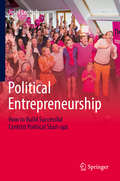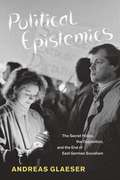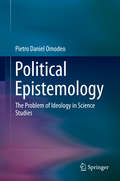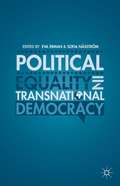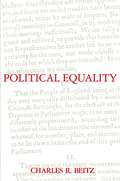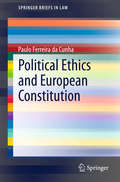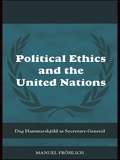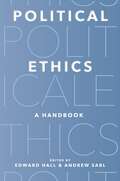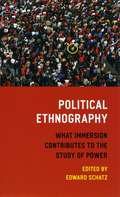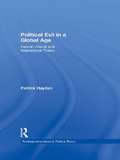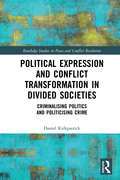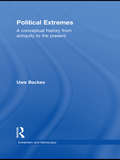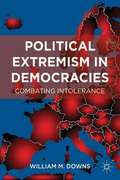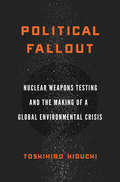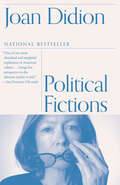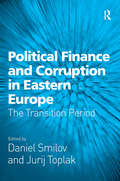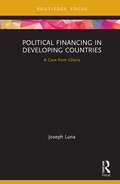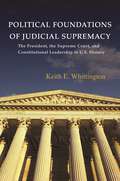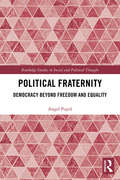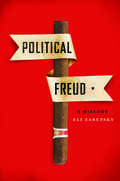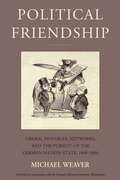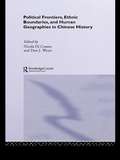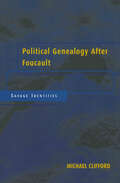- Table View
- List View
Political Entrepreneurship: How to Build Successful Centrist Political Start-ups
by Josef LentschThis book demonstrates how political entrepreneurs – entrepreneurially minded citizens who launch innovative political start-ups – can drive political change. Building on unique insights, rich examples and personal stories of centrist political entrepreneurs distilled from 40 in-depth interviews, the author guides readers through key stages of political entrepreneurship, and shows how to master them. By equally highlighting successes and failures, the book reveals how political entrepreneurs actually go about producing transformative political change.In light of the populist challenge and the decline of traditional political parties, the book also offers an entertaining backstage view and first-hand insights into the successes of En Marche in France, Ciudadanos in Spain, NEOS in Austria and other centrist political startups. It provides practical advice on how to learn from and replicate their successes. Political practitioners and other politically interested readers will find a useful theory of Political Entrepreneurship – what it is, how it works, and what its role is in 21st century democracies. Most of all, they will find essential, reproducible tools and methods.“You have read a lot about startups in business, but if you want to know how Silicon Valley style startups look in politics, read this. Its author is not only writing about political entrepreneurs, he is one of them.”Ivan Krastev (Chairman of the Centre for Liberal Strategies in Sofia, and permanent Fellow at the Institute of Human Sciences in Vienna)“No one understands better what it takes to take a political start up from ideation to the parliament than Josef Lentsch. In ‘Political Entrepreneurship’ he combines first-hand experience with a thoughtful review of what we know about entrepreneurship in the interest of society.”Johanna Mair (Professor of Organization, Strategy and Leadership at the Hertie School of Governance, and Co-Director Global Innovation for Impact Lab at Stanford University) “Josef Lentsch has produced a fascinating, commanding guide to the new, insurgent players shaking up traditional party systems and reinvigorating liberal politics. Political Entrepreneurship is essential reading for anyone who wants to understand today's fragmented and disrupted European politics - and the European politics of the future.” Jeremy Cliffe (Charlemagne columnist, The Economist)"The rarest of events has occurred - a new political species has appeared in the European eco-system, the centrist political start up. From Macron's En Marche in France to Spain's Ciudadanos, a new type of political actor has emerged. Few are better positioned to tell this Europe-wide story than Josef Lentsch who has had a front-seat view on this important political transformation that is shaking Europe. A dramatic and important account." Daniel Ziblatt (Eaton Professor of Government, Harvard University and co-author of How Democracies Die)
Political Epistemics: The Secret Police, the Opposition, and the End of East German Socialism (Chicago Studies in Practices of Meaning)
by Andreas GlaeserWhat does the durability of political institutions have to do with how actors form knowledge about them? Andreas Glaeser investigates this question in the context of a fascinating historical case: socialist East Germany’s unexpected self-dissolution in 1989. His analysis builds on extensive in-depth interviews with former secret police officers and the dissidents they tried to control as well as research into the documents both groups produced. In particular, Glaeser analyzes how these two opposing factions’ understanding of the socialist project came to change in response to countless everyday experiences. These investigations culminate in answers to two questions: why did the officers not defend socialism by force? And how was the formation of dissident understandings possible in a state that monopolized mass communication and group formation? He also explores why the Stasi, although always well informed about dissident activities, never developed a realistic understanding of the phenomenon of dissidence. Out of this ambitious study, Glaeser extracts two distinct lines of thought. On the one hand he offers an epistemic account of socialism’s failure that differs markedly from existing explanations. On the other hand he develops a theory—a sociology of understanding—that shows us how knowledge can appear validated while it is at the same time completely misleading.
Political Epistemology: The Problem of Ideology in Science Studies
by Pietro Daniel OmodeoThis book is an investigation of the ideological dimensions of the disciplinary discourses on science in line with the scholarly tradition of historical epistemology. It offers a programmatic treatment of the political-epistemological problematic along three entangled lines of inquiry: socio-historical, epistemological and historiographical. The book aims for a meta-level integration of the existing scholarship on the social and cultural history of science in order to consider the ways in which struggles for hegemony have constantly informed scientific discourses. This problematic is of primary relevance for scholars in Science Studies, philosophers, historians and sociologists of science, but would also be relevant for anybody interested in scientific culture and political theory.
Political Equality In Transnational Democracy
by Eva Erman Sofia NäsströmThis book is about the status of political equality under global political conditions. If political equality generally is considered a core feature of democracy, it has received little attention among theorists concerned with global governance. Given the enormous emphasis on democracy as legitimizing factor in global politics, this neglect is noteworthy. This book sets out to address what accounts for the neglect, on the one hand, and how it may be remedied, on the other. The overall aim is to revitalize the debate on the status of political equality in transnational democracy.
Political Equality: An Essay in Democratic Theory
by Charles R. BeitzThe description for this book, Political Equality: An Essay in Democratic Theory, will be forthcoming.
Political Ethics and European Constitution
by Paulo Ferreira da CunhaIs the dream of EU endangered? This book reviews classic and modern values and virtues, and uses them in order to rethink Europe's present politics and its future. The idea of the Republic was born with the political ethics of ancient Greece. The current international crisis obliges Europe to face the mirror of truth: What has become of the European Idea and how fares the European Constitution? It has been a long road from the Greek Politeia to the present lack of values and financial monomania in Europe, who seems to have lost any harmony between the spirit, the soul and the body of her Constitution: the will and values of the people (material constitution), the text of the Lisbon Treaty (formal constitution) and its current political interpretation and action (real constitution), making Europe a two-tier or three-tier club, far from the dream of the founding fathers. Without republican values and virtues, and failing to uphold the European social model, the European Union would devolve into moral, social and democratic bankruptcy.
Political Ethics and The United Nations: Dag Hammarskjöld as Secretary-General (Cass Series On Peacekeeping Ser.)
by Manuel FroehlichBased on a wealth of sources, files and interviews, and including previously unpublished material, this book explores the foundations of the political ethics of Dag Hammarskj�ld, the second Secretary-General of the United Nations, examining how they influenced his actions in several key crisis situations. Hammarskj�lds political innovations, such
Political Ethics: A Handbook
by Edward Hall and Andrew SablA comprehensive introduction to contemporary political ethicsWhat is the relationship between politics and morality? May politicians bend moral constraints in the name of political necessity? Is it always wrong for leaders to lie? How much political compromise is too much (or too little)? In Political Ethics, some of the world’s leading thinkers in politics, philosophy, and related fields offer a comprehensive and accessible introduction to key issues in this rapidly growing area of political theory.In a series of original essays, the contributors examine a range of urgent political problems: lies and deception, compromise and refusal to compromise, the meaning and limits of political integrity, representation and failures of representation, good and bad democratic leadership, the virtues and excesses of partisanship, administrative ethics, political corruption, whistleblowing, legitimate and illegitimate claims of political emergency, and lobbying. What emerges are realistic but demanding ethical standards—and a clear-eyed understanding of the ethical challenges of political life in the twenty-first century.With contributions by Richard Bellamy, Alin Fumurescu, Edward Hall, Suzanne Dovi and Jesse McCain, Eric Beerbohm, Russell Muirhead and Nancy Rosenblum, Joseph Heath, Elizabeth David-Barrett and Mark Philp, Michele Bocchiola and Emanuela Ceva, Nomi Lazar, Phil Parvin, and Andrew Sabl.
Political Ethnography: What Immersion Contributes to the Study of Power
by Edward SchatzScholars of politics have sought in recent years to make the discipline more hospitable to qualitative methods of research. Lauding the results of this effort and highlighting its potential for the future,Political Ethnography makes a compelling case for one such method in particular. Ethnography, the contributors amply demonstrate in a wide range of original essays, is uniquely suited for illuminating the study of politics. Situating these pieces within the context of developments in political science, Edward Schatz provides an overarching introduction and substantive prefaces to each of the volume's four sections. The first of these parts addresses the central ontological and epistemological issues raised by ethnographic work, while the second grapples with the reality that all research is conducted from a first-person perspective. The third section goes on to explore how ethnographic research can provide fresh perspectives on such perennial topics as opinion, causality, and power. Concluding that political ethnography can and should play a central role in the field as a whole, the final chapters illuminate the many ways in which ethnographic approaches can enhance, improve, and, in some areas, transform the study of politics.
Political Evil in a Global Age: Hannah Arendt and International Theory (Routledge Innovations in Political Theory)
by Patrick HaydenHannah Arendt is widely regarded as one of the twentieth century’s most powerful political theorists. The purpose of this book is to make an innovative contribution to the newly emerging literature connecting Arendt to international political theory and debates surrounding globalization. In recent years the work of Arendt has gathered increasing interest from scholars in the field of international political theory because of its potential relevance for understanding international affairs. Focusing on the central theme of evil in Arendt’s work, this book weaves together elements of Arendt’s theory in order to engage with four major problems connected with contemporary globalization: genocide and crimes against humanity; global poverty and radical economic inequality; global refugees, displaced persons, and the ‘stateless’; and the destructive domination of the public realm by predatory neoliberal economic globalization. Hayden shows that a key constellation of her concepts—the right to have rights, superfluousness, thoughtlessness, plurality, freedom, and power—can help us to understand and address some of the central problems involving political evil in our global age. In doing so, this book takes Arendtian scholarship and international political theory into provocative new directions. Political Evil in a Global Age will be of interest to students, researchers and scholars of politics, philosophy, sociology and cultural studies.
Political Exercise: Active Living, Public Policy, and the Built Environment
by Lawrence D. BrownThe public health benefits of giving city dwellers increased opportunities to lead physically active lifestyles are well known to urban planners, public health scholars, and government officials. Moreover, increases in “active living,” such as walking and cycling, help the environment, support local businesses, and reduce traffic congestion, among other advantages. But despite wide agreement that active living is both achievable and valuable, best practices are not easy to implement.In Political Exercise, Lawrence D. Brown presents five case studies of cities that have promoted active living with varying success through a range of approaches. He shows how and why the transformation of a call for public intervention into projects, programs, and policies is inescapably political. Brown argues that in order to implement policies that support active living, their proponents must give communities a sense of ownership of recommended changes in the built environment, filter the public health agenda through a range of public and private organizations, and secure committed political champions. At the intersection of public health and urban planning, Political Exercise offers a framework for scholars, policy makers, and reformers to more productively address both the rationales behind active living and the political strategies that spur change.
Political Expression and Conflict Transformation in Divided Societies: Criminalising Politics and Politicising Crime (Routledge Studies in Peace and Conflict Resolution)
by Daniel KirkpatrickThis book considers how the social construction of crime and the criminalising of political expression impact upon different stages in a violent political conflict. The freedom to express our political opinions is regarded as an essential human right throughout most of the world, and yet, in defence of our security, governments often place various restrictions on it. This book directly considers what these restrictions are in the context of deeply divided societies to understand how they impact upon intergroup relations in four different contexts: nonviolent movements, counter-insurgency, peace negotiations, and post-settlement peacebuilding. Drawing on an extensive body of original interviews and archival material, the volume analyses this relationship through an in-depth consideration of Northern Ireland and South Africa, followed by a wider analysis of Turkey, Sri Lanka, Belgium, and Canada. The overarching argument is that the implications of criminalising political expression depend on both its ‘target’ and the wider social reality it contributes towards. This book will be of much interest to students of conflict resolution, transitional justice, law, and International Relations.
Political Extremes: A conceptual history from antiquity to the present (Extremism and Democracy)
by Uwe BackesThe Western tradition of the constitutional state, with its ancient roots, defines political extremes as the epitome of that what must be absolutely rejected. It highlights tyranny, despotism, despotic rule, non-autonomy, ruthless enforcing of interests as ‘extreme’, contrasting this to a virtuous mean which guarantees moderation. In this volume, the culmination of twenty years of extensive research, Uwe Backes provides a conceptual history of the notions "extreme" and "extremism" from antiquity to the present day. The terminological history of political extremes had been related for more then two millennia with the term mesotês used in the Aristotelian ethics and the theory of mixed constitution. Both doctrines influenced the republicanism of the North Italian city states and later the United States of America as well as British parliamentarism. The positions of moderation and extremes were not joined until the course of the French Revolution with the distinction of right- and left-wing, and this is how it still exists today in the intellectual-political geography. This unique source based study reconstructs these developments from ancient times to the present. Tracing the history of the concept of political extremism from Ancient Greece to the present day, this is an invaluable resource for scholars of democracy, extremism and political sociology.
Political Extremism in Democracies
by William M. DownsWhen political 'extremists' - organized into parties that compete openly and successfully in democratic elections - enter the conventional institutional arena, how do mainstream actors react? This book deals with understanding how democracies respond to party-based extremism and with what consequences.
Political Fallout: Nuclear Weapons Testing and the Making of a Global Environmental Crisis
by Toshihiro HiguchiPolitical Fallout is the story of one of the first human-driven, truly global environmental crises—radioactive fallout from nuclear weapons testing during the Cold War—and the international response. Beginning in 1945, the United States, Britain, and the Soviet Union detonated hundreds of nuclear weapons in the atmosphere, scattering a massive amount of radioactivity across the globe. The scale of contamination was so vast, and radioactive decay so slow, that the cumulative effect on humans and the environment is still difficult to fully comprehend. The international debate over nuclear fallout turned global radioactive contamination into an environmental issue, eventually leading the nuclear superpowers to sign the landmark Partial Test Ban Treaty (PTBT) in 1963. Bringing together environmental history and Cold War history, Toshihiro Higuchi argues that the PTBT, originally proposed as an arms control measure, transformed into a dual-purpose initiative to check the nuclear arms race and radioactive pollution simultaneously. Higuchi draws on sources in English, Russian, and Japanese, considering both the epistemic differences that emerged in different scientific communities in the 1950s and the way that public consciousness around the risks of radioactive fallout influenced policy in turn. Political Fallout addresses the implications of science and policymaking in the Anthropocene—an era in which humans are confronting environmental changes of their own making.
Political Fictions
by Joan DidionIn these coolly observant essays, Joan Didion looks at the American political process and at "that handful of insiders who invent, year in and year out, the narrative of public life." Through the deconstruction of the sound bites and photo ops of three presidential campaigns, one presidential impeachment, and an unforgettable sex scandal, Didion reveals the mechanics of American politics. She tells us the uncomfortable truth about the way we vote, the candidates we vote for, and the people who tell us to vote for them. These pieces build, one on the other, into a disturbing portrait of the American political landscape, providing essential reading on our democracy.From the Trade Paperback edition.
Political Finance and Corruption in Eastern Europe: The Transition Period
by Daniel SmilovOne characteristic of Central and Eastern European democracies in transition is the lack of stability in terms of accountability and transparency in practices of political party financing. This key volume provides a thorough and well-structured post-communist study of political finance, election campaign and party funding issues within this region, focusing specifically on Central and Eastern European countries. It outlines best practices for political party and election campaign financing, discusses the shortcomings of political funding schemes and highlights the scandals that emerge under investigation. Providing an illuminating analysis of how current regulations of political finance succeed in controlling the rise of political corruption, the volume will be indispensable for anyone interested in the efficiency of regulation in party funding.
Political Financing in Developing Countries: A Case from Ghana (Routledge Explorations in Development Studies)
by Joseph LunaThis book argues that to fully grasp the decision-making of politicians and political actors in developing countries, we must first understand how politicians finance their campaigns for office—and to whom they are indebted and expected to repay. Political Financing in Developing Countries focuses on Ghana in depth, a country often held up as an example of a successful, two-party democracy with regular party changes in government. However, it is unlikely that candidates and political parties are wealthy enough to finance the increasing costs of campaigns and constituent demands, and successful democratic outcomes could be masking a system that actually hinders development progress. Drawing on nearly 200 interviews and extensive fieldwork, this book posits that political funds are extracted by an iron square of politicians, bureaucrats, construction contractors, and political-party chairs which rigs the procurement of local-development projects to generate kickbacks. The iron square remains robust across party changes in government due to reciprocity obligations that minimize contractors’ income risks. Ultimately, this web of kickbacks diminishes the quality of development by reducing the funds available for projects and distorting incentives to monitor projects. To break this iron square, the book recommends replacing sealed-bid procurement—a "best practice" that ignores on-the-ground realities—with a system that accounts for income stabilization and social obligations. Overall, the book argues that scholars of development should advance research on political finance to identify and then alleviate the games that decision makers must play to survive in the political sphere. Political Financing in Developing Countries will be an important and timely resource for scholars across development studies, politics, economics, and African Studies.
Political Foundations of Judicial Supremacy: The Presidency, the Supreme Court, and Constitutional Leadership in U.S. History (Princeton Studies in American Politics: Historical, International, and Comparative Perspectives #105)
by Keith E. WhittingtonShould the Supreme Court have the last word when it comes to interpreting the Constitution? The justices on the Supreme Court certainly seem to think so--and their critics say that this position threatens democracy. But Keith Whittington argues that the Court's justices have not simply seized power and circumvented politics. The justices have had power thrust upon them--by politicians, for the benefit of politicians. In this sweeping political history of judicial supremacy in America, Whittington shows that presidents and political leaders of all stripes have worked to put the Court on a pedestal and have encouraged its justices to accept the role of ultimate interpreters of the Constitution. Whittington examines why presidents have often found judicial supremacy to be in their best interest, why they have rarely assumed responsibility for interpreting the Constitution, and why constitutional leadership has often been passed to the courts. The unprecedented assertiveness of the Rehnquist Court in striking down acts of Congress is only the most recent example of a development that began with the founding generation itself. Presidential bids for constitutional leadership have been rare, but reflect the temporary political advantage in doing so. Far more often, presidents have cooperated in increasing the Court's power and encouraging its activism. Challenging the conventional wisdom that judges have usurped democracy, Whittington shows that judicial supremacy is the product of democratic politics.
Political Fraternity: Democracy beyond Freedom and Equality (Routledge Studies in Social and Political Thought)
by Angel PuyolFraternity is a feeling, and a moral virtue, but fraternity is also a political concept. The French Revolution proclaimed an ethical and political ideal with its three principles: liberty, equality and fraternity. Since then, western political philosophy has gone to great lengths to analyse the liberty and equality, but has ignored, and even disdained, the third part of the revolutionary triad: fraternity. Forgetting or underestimating fraternity as a political category is unjustifiable. Political fraternity can help us to overcome some of the main problems with liberal egalitarianism and theories of liberty in current social and political thought, and it contributes to a better understanding of the real significance of justice and democracy. In this book, Angel Puyol examines the theoretical and normative challenges of the political idea of fraternity, its history and meanings, its role in current political philosophy, its distinction regarding related concepts – such as relational equality, solidarity or civic friendship – the place that political fraternity should occupy in feminist criticism, and its relationship to social justice, global justice and democracy in modern-day politics.
Political Freud: A History
by Eli ZaretskyIn this masterful history, Eli Zaretsky reveals the power of Freudian thought to illuminate the great political conflicts of the twentieth century. Developing an original concept of "political Freudianism," he shows how twentieth-century radicals, activists, and intellectuals used psychoanalytic ideas to probe consumer capitalism, racial violence, anti-Semitism, and patriarchy. He also underscores the continuing influence and critical potential of those ideas in the transformed landscape of the present. Zaretsky's conception of political Freudianism unites the two overarching themes of the last century—totalitarianism and consumerism—in a single framework. He finds that theories of mass psychology and the unconscious were central to the study of fascism and the Holocaust; to African American radical thought, particularly the struggle to overcome the legacy of slavery; to the rebellions of the 1960s; and to the feminism and gay liberation movements of the 1970s. Nor did the influence of political Freud end when the era of Freud bashing began. Rather, Zaretsky proves that political Freudianism is alive today in cultural studies, the study of memory, theories of trauma, postcolonial thought, film, media and computer studies, evolutionary theory and even economics.
Political Friendship: Liberal Notables, Networks, and the Pursuit of the German Nation State, 1848-1866 (Studies in German History #29)
by Michael WeaverBetween periods of revolution, state repression, and war across Central and Western Europe from the 1840s through the 1860s, German liberals practiced politics beyond the more well-defined realms of voluntary associations, state legislatures, and burgeoning political parties. Political Friendship approaches 19th century German history’s trajectory to unification through the lens of academics, journalists, and artists who formed close personal relationships with one another and with powerful state leaders. Michael Weaver argues that German liberals thought with their friends by demonstrating the previously neglected aspects of political friendship were central to German political culture.
Political Frontiers, Ethnic Boundaries and Human Geographies in Chinese History
by Nicola Di Cosmo Don J. WyattBoundaries - demanding physical space, enclosing political entities, and distinguishing social or ethnic groups - constitute an essential aspect of historical investigation. It is especially with regard to disciplinary pluralism and historical breadth that this book most clearly departs and distinguishes itself from other works on Chinese boundaries and ethnicity. In addition to history, the disciplines represented in this book include anthropology (particularly ethnography), religion, art history, and literary studies. Each of the authors focuses on a distinct period, beginning with the Zhou dynasty (c. 1100 BCE) and ending with the early centuries after the Manchu conquest (c. CE 1800) - resulting in a chronological sweep of nearly three millennia.
Political Game Theory
by Nolan Mccarty Adam MeirowitzPolitical Game Theory, first published in 2007, is a self-contained introduction to game theory and its applications to political science. The book presents choice theory, social choice theory, static and dynamic games of complete information, static and dynamic games of incomplete information, repeated games, bargaining theory, mechanism design and a mathematical appendix covering, logic, real analysis, calculus and probability theory. The methods employed have many applications in various disciplines including comparative politics, international relations and American politics. Political Game Theory is tailored to students without extensive backgrounds in mathematics, and traditional economics, however there are also many special sections that present technical material that will appeal to more advanced students. A large number of exercises are also provided to practice the skills and techniques discussed.
Political Genealogy After Foucault: Savage Identities
by Michael CliffordCombining the most powerful elements of Foucault's theories, Clifford produces a methodology for cultural and political critique called "political genealogy" to explore the genesis of modern political identity. At the core of American identity, Clifford argues, is the ideal of the "Savage Noble," a hybrid that married the Native American "savage" with the "civilized" European male. This complex icon animates modern politics, and has shaped our understandings of rights, freedom, and power.
